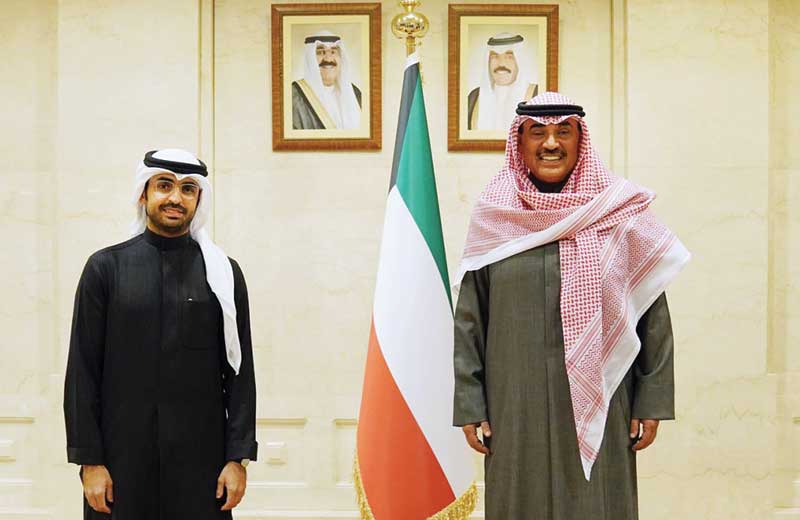 KUWAIT: HH the Prime Minister Sheikh Sabah Al-Khaled Al-Hamad Al-Sabah meets Kuwait Times Deputy Editor-in-Chief Abdullah Boftain yesterday. - KUNA
KUWAIT: HH the Prime Minister Sheikh Sabah Al-Khaled Al-Hamad Al-Sabah meets Kuwait Times Deputy Editor-in-Chief Abdullah Boftain yesterday. - KUNABy Abdullah Boftain
Kuwait Times Deputy Editor-in-Chief
KUWAIT: HH the Prime Minister Sheikh Sabah Al-Khaled Al-Hamad Al-Sabah met editors-in-chief of local newspapers yesterday, including Kuwait Times Deputy Editor-in-Chief Abdullah Boftain. The premier said "combating corruption will be a priority for the Cabinet" as instructed by HH the Amir upon Sheikh Sabah Al-Khaled's appointment.
Sheikh Sabah acknowledged the country had been facing an economic dilemma even before the outbreak of the coronavirus pandemic, and if this problem is not resolved, Kuwait's financial status will be affected. He noted Kuwait is in a strong financial position, but the economy needs restructuring and reform, and failure to do so could impact Kuwait's longer term economic health. He however insisted that any measures or reforms will not "touch" the pockets of Kuwaiti citizens.
The finance ministry announced on Tuesday the budget for the 2021-2022 fiscal year, projecting KD 10.9 billion in revenues and KD 23 billion in expenditure, for a deficit of KD 12.1 billion with oil prices budgeted at $45 per barrel. "We started the reform in the Kuwaiti house. And we will continue in order to do what's needed to achieve more economic reform," the premier told the media leadership.
Sheikh Sabah said he intends to hold meetings with parliamentary blocs and civil society groups to explore their opinions on the formation of the new Cabinet. No timeline was provided for when a new Cabinet might be appointed, but it's likely to take some time.
The prime minister also invited the media leadership in Kuwait to offer their views on Kuwait's press laws and any amendments or other changes that need to be made to further enhance and develop Kuwait's freedom of speech, noting that this would be another agenda item for his Cabinet moving forward.
The prime minister also called out Kuwait's troubled education sector. Schools - both public and private - have been closed to on-campus learning since March 2020 and it is unclear when they may reopen. "There is a failure in Kuwait's educational system and we need to work urgently to solve this problem," Sheikh Sabah Al-Khaled said.
Regarding the transition to Phase 5 of Kuwait's reopening, the prime minister said that this needs to happen to boost the economy and support troubled SMEs, but it cannot take place until a greater percentage of citizens and residents in Kuwait are vaccinated. The premier did not offer a specific target number of vaccinations or timeline, but said since the start of the vaccination campaign, some 35,000 Kuwaitis and expats have been vaccinated.
Sheikh Sabah said the government last year referred 282 cases of trafficking in persons and visa trading to the public prosecution, in addition to around 122 corruption cases. The premier said time is needed to rectify the imbalance in the demographic structure in the country because expats form 70 percent of the population against 30 percent citizens. He said a number of laws and bylaws will be implemented that will impact the population structure.










